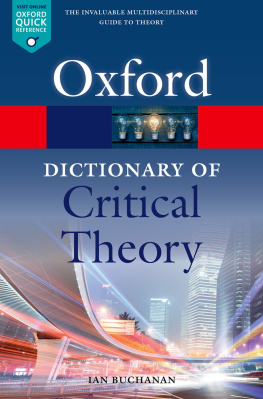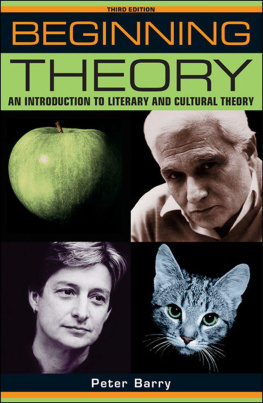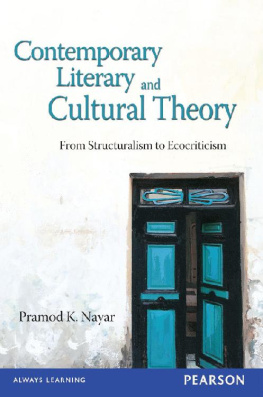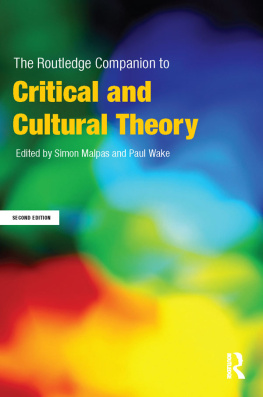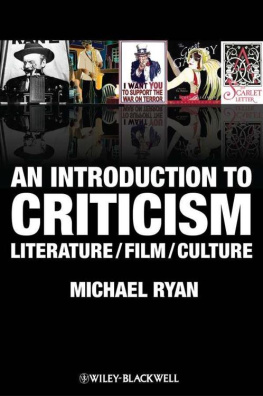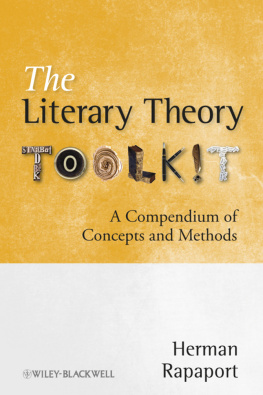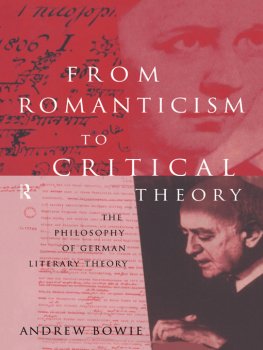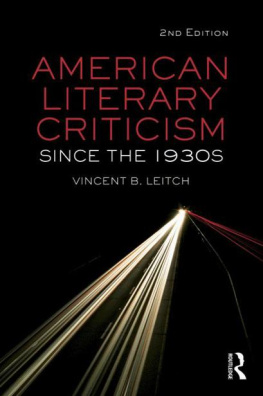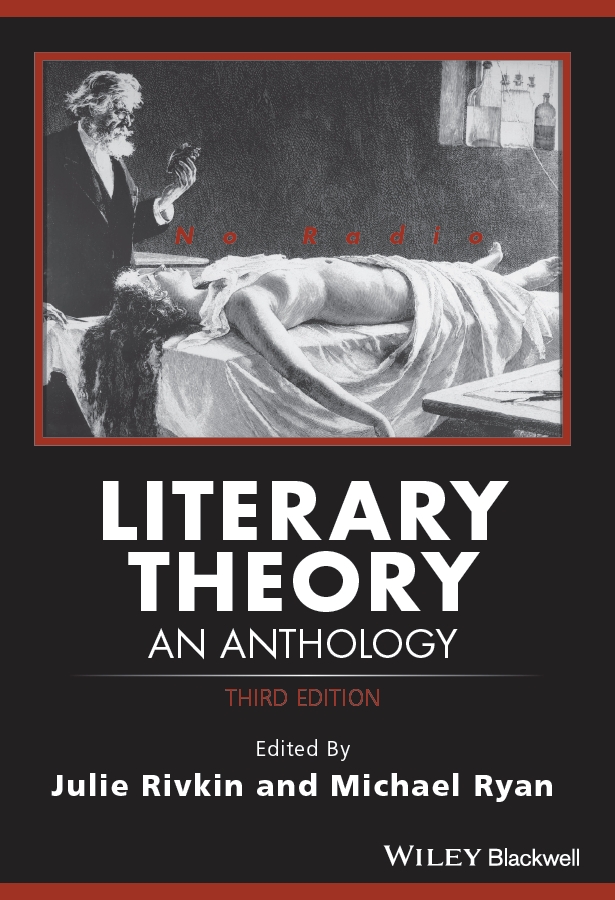
Table of Contents
List of Illustrations
- Chapter 1-7
- Chapter 10-6
- Chapter 10-7
- Chapter 10-9
- Chapter 2-11
- Chapter 2-4
- Chapter 5-6
- Chapter 6-12
- Chapter 7-9
- Chapter 9-5
- Chapter 9-7
- Chapter 9-8
Guide
Pages
For Gabriel and Nathaniel
LITERARY THEORY
AN ANTHOLOGY
THIRD EDITION
Edited by Julie Rivkin and Michael Ryan
This third edition first published 2017
2017 John Wiley & Sons, Ltd
Edition history: Blackwell Publishing Ltd (1e, 1998); Blackwell Publishing Ltd (2e, 2004)
Registered Office
John Wiley & Sons, Ltd, The Atrium, Southern Gate, Chichester, West Sussex, PO19 8SQ, UK
Editorial Offices
350 Main Street, Malden, MA 021485020, USA
9600 Garsington Road, Oxford, OX4 2DQ, UK
The Atrium, Southern Gate, Chichester, West Sussex, PO19 8SQ, UK
For details of our global editorial offices, for customer services, and for information about how to apply for permission to reuse the copyright material in this book please see our website at www.wiley.com/wileyblackwell.
The right of Julie Rivkin and Michael Ryan to be identified as the authors of the editorial material in this work has been asserted in accordance with the UK Copyright, Designs and Patents Act 1988.
All rights reserved. No part of this publication may be reproduced, stored in a retrieval system, or transmitted, in any form or by any means, electronic, mechanical, photocopying, recording or otherwise, except as permitted by the UK Copyright, Designs and Patents Act 1988, without the prior permission of the publisher.
Wiley also publishes its books in a variety of electronic formats. Some content that appears in print may not be available in electronic books.
Designations used by companies to distinguish their products are often claimed as trademarks. All brand names and product names used in this book are trade names, service marks, trademarks or registered trademarks of their respective owners. The publisher is not associated with any product or vendor mentioned in this book.
Limit of Liability/Disclaimer of Warranty: While the publisher and authors have used their best efforts in preparing this book, they make no representations or warranties with respect to the accuracy or completeness of the contents of this book and specifically disclaim any implied warranties of merchantability or fitness for a particular purpose. It is sold on the understanding that the publisher is not engaged in rendering professional services and neither the publisher nor the author shall be liable for damages arising herefrom. If professional advice or other expert assistance is required, the services of a competent professional should be sought.
Library of Congress CataloginginPublication data
Names: Rivkin, Julie, editor. | Ryan, Michael, 1951 editor.
Title: Literary theory : an anthology / edited by Julie Rivkin, Michael Ryan.
Description: Third edition. | Hoboken : John Wiley & Sons Ltd., 2017. | Includes bibliographical references, glossary, and index.
Identifiers: LCCN 2016014427| ISBN 9781118707852 (pbk.) | ISBN 9781118718384 (epub)
Subjects: LCSH: LiteraturePhilosophy. | LiteratureHistory and criticismTheory, etc.
Classification: LCC PN45 .L512 2017 | DDC 801dc23
LC record available at https://lccn.loc.gov/2016014427
A catalogue record for this book is available from the British Library.
Cover image: Barbara Kruger: Untitled (No Radio), photograph 51" 68," 1988.
Collection Don/Doris Fisher, San Francisco, courtesy Mary Boone Gallery, New York.
Preface
This book began, as one might guess, in the classroom. We have been teaching courses in contemporary literary theory for the past two decades, and we have each had the familiar experience of not being able to match the design of our courses to any anthology currently available. The move from awkwardly assembled xerox packets to an actual anthology has been both a natural outgrowth of our teaching and an astonishingly complex process of research, selection, and projection. For although the germ of the book was our own classroom(s), its destination has always been many classrooms, courses no doubt much different than any we ourselves might teach, and yet ones that our selections would ideally work both to accommodate and to enrich.
The scale of the volume is one expression of its projected flexibility; we felt that an anthology of literary theory needed not only to cover the range of theoretical perspectives or approaches that characterize the era after the New Criticism, the era that we take to be that of contemporary literary theory, but also to represent those perspectives with reasonable depth and range. The effect of such a decision, we hope, is that many kinds of courses will find a home in these selections, that a course that takes as its focus Structuralism, PostStructuralism, PostColonialism, or Psychoanalysis and Gender Studies will find this anthology as useful as one that makes a more extensive survey of theoretical perspectives.
The anthology opens with formalisms both Russian and American in a gesture that marks its organization as partly chronological and partly heuristic. That is, we take formalism at least in its American avatar of New Criticism to mark the condition of students theoretical awareness before beginning the journey into theory. To the degree that they have been taught a form of close reading as the basic task of literary analysis, they are practicing formalists, though the practice may be, like that of the prosespeaking M. Jourdain in Molires Bourgeois Gentilhomme, an unselfconscious one. Exploring the theoretical premises of a New Critical practice, placing those in conjunction with a historically unrelated yet theoretically cognate predecessor, Russian Formalism, seems like an appropriate way to initiate an exposure to theory in its less familiar guises.
The parts themselves have undergone many evolutions; the issue of where to draw the lines, what denomination to use, and where to locate certain selections has been as theoretically complex as it has been practically consequential. While Deconstruction, for example, enjoyed a separate life in literary critical history in the US in the 1970s and 1980s, we felt it more appropriate to place it within its historical and intellectual French context, and so you will find Derrida amongst Deleuze and Guattari, and Baudrillard under PostStructuralism. The question of how to categorize some kinds of theory, regarding gender, for example, was also difficult, and we opted for a big tent: A separate section could easily have been devoted to any number of theoretical projects, each of which has already produced its own classic texts, and while attending to these developments has been one goal of the anthology, we wished as well to embrace both the heterodox and the newly canonical. Some of the names in our table of contents may not be readily recognizable for this reason, and our inclusion of these texts is less a sign of presumption regarding future canonicity than it is an indicator of our desire to locate the anthology as much in the contemporary realm as possible. That has meant guessing, and we based our guesses on what we felt would be exciting or helpful in the classroom.
In a desire both to be as inclusive as possible and to represent works not commonly anthologized, we have done a certain amount of excerpting. Our principle has been to represent the core of a given work, and if, to that end, we have sacrificed portions of texts that readers will deem necessary, we can only suggest that our selections constitute a useful beginning to a more extensive acquaintance. We apologize in advance for any such textual editing deemed brutal.
Next page

